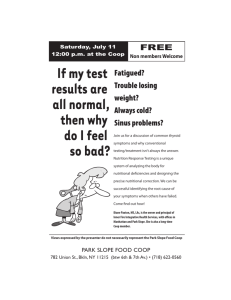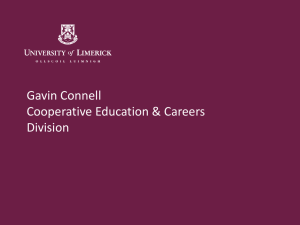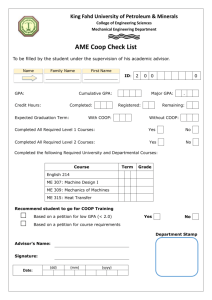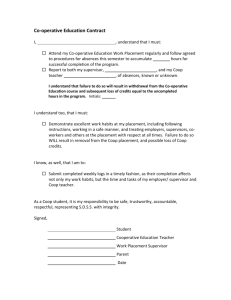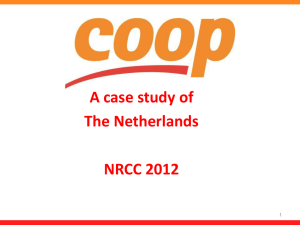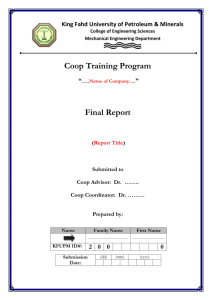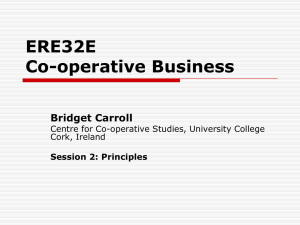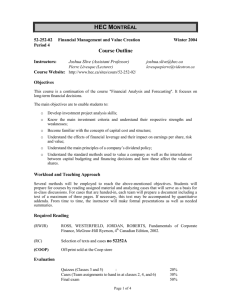European Community of Consumer Co
advertisement
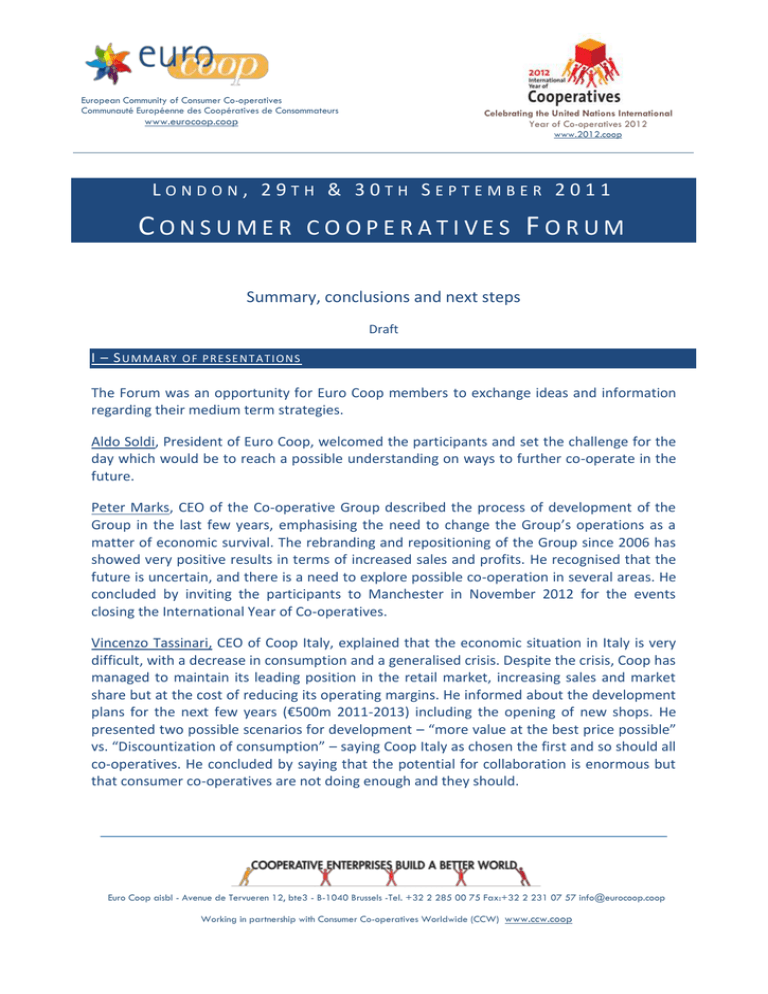
European Community of Consumer Co-operatives Communauté Européenne des Coopératives de Consommateurs Celebrating the United Nations International Year of Co-operatives 2012 www.2012.coop www.eurocoop.coop LONDON, 29TH & 30TH SEPTEMBER 2011 CONSUMER COOPERATIVES FORUM Summary, conclusions and next steps Draft I – SUMMARY O F P R E SE N T A T I ON S The Forum was an opportunity for Euro Coop members to exchange ideas and information regarding their medium term strategies. Aldo Soldi, President of Euro Coop, welcomed the participants and set the challenge for the day which would be to reach a possible understanding on ways to further co-operate in the future. Peter Marks, CEO of the Co-operative Group described the process of development of the Group in the last few years, emphasising the need to change the Group’s operations as a matter of economic survival. The rebranding and repositioning of the Group since 2006 has showed very positive results in terms of increased sales and profits. He recognised that the future is uncertain, and there is a need to explore possible co-operation in several areas. He concluded by inviting the participants to Manchester in November 2012 for the events closing the International Year of Co-operatives. Vincenzo Tassinari, CEO of Coop Italy, explained that the economic situation in Italy is very difficult, with a decrease in consumption and a generalised crisis. Despite the crisis, Coop has managed to maintain its leading position in the retail market, increasing sales and market share but at the cost of reducing its operating margins. He informed about the development plans for the next few years (€500m 2011-2013) including the opening of new shops. He presented two possible scenarios for development – “more value at the best price possible” vs. “Discountization of consumption” – saying Coop Italy as chosen the first and so should all co-operatives. He concluded by saying that the potential for collaboration is enormous but that consumer co-operatives are not doing enough and they should. Euro Coop aisbl - Avenue de Tervueren 12, bte3 - B-1040 Brussels -Tel. +32 2 285 00 75 Fax:+32 2 231 07 57 info@eurocoop.coop Working in partnership with Consumer Co-operatives Worldwide (CCW) www.ccw.coop European Community of Consumer Co-operatives Communauté Européenne des Coopératives de Consommateurs www.eurocoop.coop Celebrating the United Nations International Year of Co-operatives 2012 www.2012.coop Gabriel Csollar, CEO of Coop Euro, presented the situation in the central and eastern European markets characterized by a strong competition from multinational retailers. He presented the strategy of Coop Jednota Slovakia to face the challenges of competition, based on the consolidation of the retail network, integrated purchasing and communications, the development of private labels and a multifunctional loyalty programme. He illustrated the work of Coop Euro as an example of international cooperation among consumer co-operatives in the area of purchasing. He concluded by indicating the areas where possible future collaboration is desirable, including pan-European purchasing. Agustin Markaide, CEO of Eroski, focused his presentation on the issue of involving consumers with the store. He presented the history of Eroski and its involvement in consumer and membership issues. He then presented the model for the future that Eroski intends to implement, based on the development of a personalised relation between the consumer-member with the store. The main challenge is to turn consumers into partners in terms of the local management of stores. This also implies a bigger involvement and responsibility of store managers at local level. He concluded by stating the objective of Eroski to come closer to consumers. Thomas Bagge Olesen, CEO of FDB, explained the structure and business model of consumer co-operatives in Denmark. He put emphasis in sustainability issues but also the search for the correct and most efficient business model. He considered that the major challenge for the future is to define the correct business model, especially focusing on food retail and probably less so in other retail areas. He considered important putting in practice the cooperative principles in a way that is known and understood by consumers, giving several examples from Denmark. Kuisma Niemelä, CEO of SOK, started his presentation by explaining the structure and business model of SOK. He emphasised the fact that the success of SOK in recent years has been based in providing innovative services to members and real benefits for members. With the vision that consumer co-operatives are the consumers’ own-stores, SOK strategy is based in three different axes: membership; comprehensive services offer and combining the regional with national. To conclude, he highlighted the importance of balancing the cooperative operations and the competitiveness of the enterprise. The presentations are available by clicking here. Euro Coop aisbl - Avenue de Tervueren 12, bte3 - B-1040 Brussels -Tel. +32 2 285 00 75 Fax:+32 2 231 07 57 info@eurocoop.coop Working in partnership with Consumer Co-operatives Worldwide (CCW) www.ccw.coop European Community of Consumer Co-operatives Communauté Européenne des Coopératives de Consommateurs www.eurocoop.coop II – S U M M A R Y Celebrating the United Nations International Year of Co-operatives 2012 www.2012.coop OF D I S CU SS I O N S The discussions were centred in two main topics: collaboration in purchasing and access to finance for investment. Regarding purchasing, some participants highlighted that there is a huge potential for collaboration and that this is a way to face many of the current and future challenges. Purchasing was seen by many as a way to reduce costs and gain economies of scale. It was also underlined that given the same nature of the enterprises, i.e. consumer co-operatives, collaboration should be the obvious thing to do and could rely on the sharing of the same values and principles. However, some participants highlighted the fact that collaboration in purchasing is not an easy thing to achieve and there are many challenges such as differences in national markets, in product assortment, in retail formats, etc. Some participants were supportive of an ambitious approach aiming at developing wide range collaboration while others considered that a more conservative approach would be better to start. Regarding investment, all participants agreed that investment is essential to continue to be competitive and improve the market situation. However, some participants considered that there is a challenge in raising capital for investment given the nature of consumer cooperatives. While some participants did not consider this as a major challenge in their national context they recognised that co-operation on this issue would be desirable. Other potential areas for co-operation were also raised but from a general perspective, e.g. relations with consumer-members. III – C ON CLU SI O N S All participants agreed that collaboration is desirable and should be actively sought. However, it is necessary to proceed with caution and in a practical and realistic way. Participants agreed that they would need some time to go back to their organisations and discuss internally on the options going forward. This reflexion should be done until the end of 2011. Euro Coop aisbl - Avenue de Tervueren 12, bte3 - B-1040 Brussels -Tel. +32 2 285 00 75 Fax:+32 2 231 07 57 info@eurocoop.coop Working in partnership with Consumer Co-operatives Worldwide (CCW) www.ccw.coop European Community of Consumer Co-operatives Communauté Européenne des Coopératives de Consommateurs Celebrating the United Nations International Year of Co-operatives 2012 www.2012.coop www.eurocoop.coop It was agreed that Euro Coop should continue to be the facilitator of this process and that it should try to set a meeting in early 2012 to discuss practical ways of moving forward. Beforehand, the secretariat should circulate a questionnaire to gather the views of the different members on concrete proposals. This meeting should not aim of re-discussing the same issues but rather focus on concrete proposals of future co-operation taking into account the conclusions of the internal reflections of member organisations and the results of the questionnaire. It was agreed that the events in Manchester in 2012, following Peter Marks’ invitation are a potential target in terms of timing to achieve the basis for future co-operation. Comments to this draft are welcomed until the 15th of November *** Euro Coop aisbl - Avenue de Tervueren 12, bte3 - B-1040 Brussels -Tel. +32 2 285 00 75 Fax:+32 2 231 07 57 info@eurocoop.coop Working in partnership with Consumer Co-operatives Worldwide (CCW) www.ccw.coop
